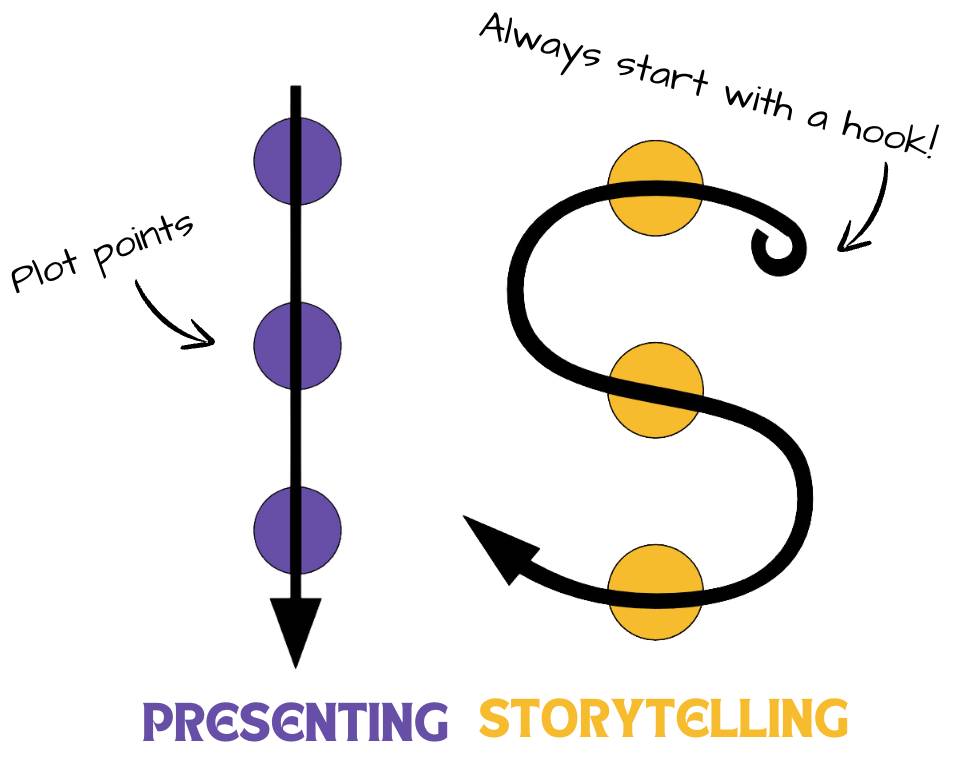The Storytelling Workbook
Got an upcoming pitch competition you need help preparing for? Let CEI support your success with our own pitch competition storytelling workbook. This workbook gives you guiding questions and storytelling techniques to help you weave together a compelling pitch to share your ideas with the world.
The Storytelling Framework
Presenting and storytelling... how are they different?
We have long been trained to present our ideas in class and work, to aim for concision and delivery perfection. Storytelling challenges this convention by encouraging people to present new ideas in a more memorable, engaging, and humanistic manner.

|
PRESENTING |
STORYTELLING |
|---|---|
|
Linear, follows head logic |
Dynamic, follows heart logic |
|
Goes straight to the point |
Takes invigorating detours |
|
Information is key |
Engagement is key |
The Storyteller's Mindset
Here are five mindsets (the 5Rs) to tap into when you are trying to turn information into a story.
You probably use many of these techniques in your daily lives, but you may be unaccustomed to leaning into your natural storyteller’s instinct for school or work.
Regale
Use humor and authenticity to humanize your story and captivate your audience.
Realize
Establish the current state of “what is,” then reveal the future state of “what could be.”
Resonate
Empathize with and connect your heart with your audience’s heart.
Recall
Conjuring a memory of the who, what, when, where, and why surrounding your idea.
Revere

Admire your idea outwardly so your audience may mirror your feelings.
Plot Points in a Business Idea Pitch
Plot points are instances that propel a story forward. From reviewing a collection of great idea pitches and pitch competition requirements, we identified the following plot points as must-haves (and some guiding questions to help):
- Hook + Problem Start with a bang! Try a statement, question, or fact that will immediately get people to pay attention.
- What are you solving?
- Who are you solving it for?
- Why should people care? Why is it important? Why now?
- Solution (in customers' terms) Follow the format: I help X do Y, by doing Z. (X= The Customer/User, Y= What the user needs to accomplish, and Z= What are you offering them to help)
- Who do you help?
- What help do they need?
- What do you do to help them?
- Industry Who are the sellers next to you?
- What industry are you in? Where is it in the industry lifecycle?
- Who are the sellers next to you/your competition?
- How do you plan on standing out/differentiating?
- Market Who are the buyers in your industry?
- Who are the buyers in your industry?
- Is your market big enough? Does it have growth potential?
- How are you reaching out to your market?
- Model How is your money coming in and how much?
- How are you making money?
- What channels/methods are you using to make money?
- How much will you charge/how many will you sell/what are your profit and projections?
- Milestone What have you accomplished and why are you the one to do this?
- What have you accomplished for your business?
- Have you built a team? Have you won other competitions?
- What has your customer said about your business?
- Ask What do you want out of this pitch? Close the loop by bringing back the hook or problem.
- What do you want out of this pitch?
- How will you use the prize money?
- How will the prize money help your business?
Timing Suggestions
Different competitors usually have different requirements for time limits, in which case, you may refer to these timing suggestions when writing each plot point. Some plot points are combined for shorter pitches, so you must decide what your audience needs to know.
Also, be mindful that different competitions request specific components in a pitch, and our recommendation would be to spend more time covering the required details.
|
60-Second Pitch |
90-Second Pitch |
3-Minute Pitch |
5-Minute Pitch |
|---|---|---|---|
|
|
|
|
Ready to give it a go?
Start crafting your pitch with the Printable Storytelling Worksheet PDF
The Storytelling Workbook was originally created by the CEI Graduate Assistant, Jowei Yek.

